A recent article in South African media started an uproar over a well-known foundation’s alleged links to Hamas. Its founder Dr. Imtiaz Sooliman, and a network of Muslim charitable NGOs, spoke out vociferously denying the allegations that the “Gift of the Givers Foundation”, was in fact financially linked to a terrorist organization..
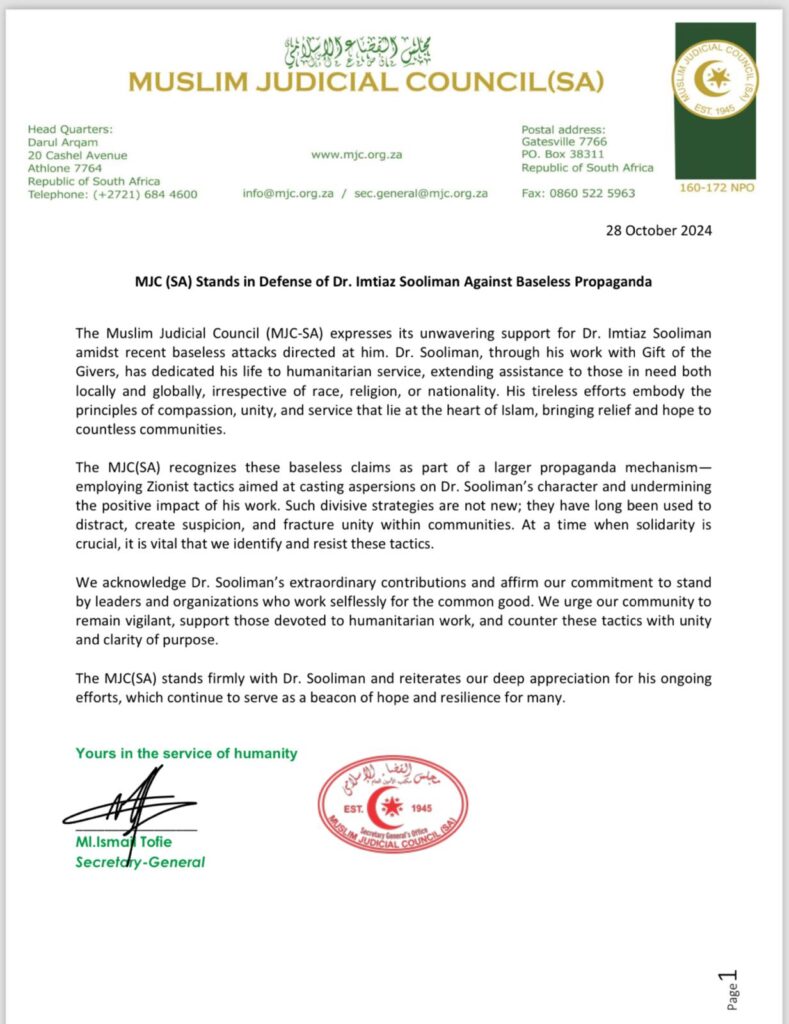
Gift of the Givers Foundation (GOTG), under Dr. Imtiaz Sooliman’s leadership, is widely recognized as South Africa’s premier humanitarian organization, lauded for its crisis response in over 45 countries, including relief work during disasters and crises. However, recent revelations have sparked serious questions about GOTG’s transparency, its affiliations with sanctioned groups, and its founder’s ideological stance. The Helen Suzman Foundation’s decision to feature Dr. Sooliman in its Memorial Lecture series has raised the stakes, as GOTG’s associations come under greater scrutiny. [1]
These allegations have significant implications for a wide range of stakeholders, including law enforcement, intelligence agencies, financial regulators, and the general public, both in South Africa and globally. By examining the ideological and financial underpinnings of GOTG and its ties to organizations such as the Union of Good, this piece aims to shed light on the potential risks and broader consequences tied to its operations.
Background on Gift of the Givers and Its Foundations
Founded by Dr. Imtiaz Sooliman in 1992, Gift of the Givers is a prominent South African humanitarian organization, registered as Waqful Waqifin [2]. GOTG has a remarkable record of providing essential supplies, medical care, and on-the-ground support during natural disasters and conflicts, from local interventions in South Africa to international missions in Gaza, Syria, and Yemen. Despite its noble mission, GOTG’s foundations trace back to organizations with controversial associations.
Dr. Sooliman initially founded the Al Aqsa Foundation in South Africa in the early 1990s. The foundation has since been blacklisted by numerous countries, including the U.S. and members of the European Union, due to its alleged financial support of Hamas, a designated Foreign Terrorist Organization.
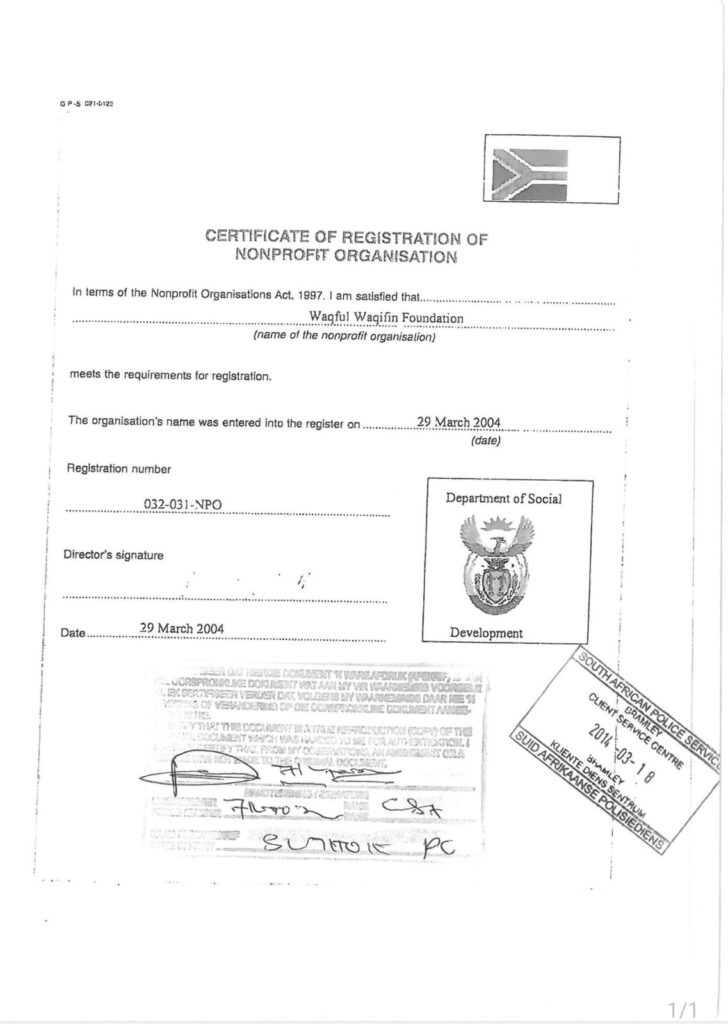
Though Dr. Sooliman has claimed to have distanced himself from Al Aqsa before establishing GOTG, this background remains part of the GOTG narrative, as he has close ties to Shek Ebrahim Gabriels, who was Al Aqsa Foundation SA’s leader at the time it was sanctioned. The Al Quds Foundation, which is associated with Hamas, has indeed faced financial repercussions due to concerns about its possible role in terror financing. Specifically, in South Africa, two banks reportedly froze the accounts of the Al-Aqsa Foundation in 2013 [3] due to its links to terror financing. This action reflects the international stance on organizations associated with Hamas, especially those listed under the U.S. Treasury’s Office of Foreign Assets Control (OFAC) designation, as entities believed to financially support Hamas [3].
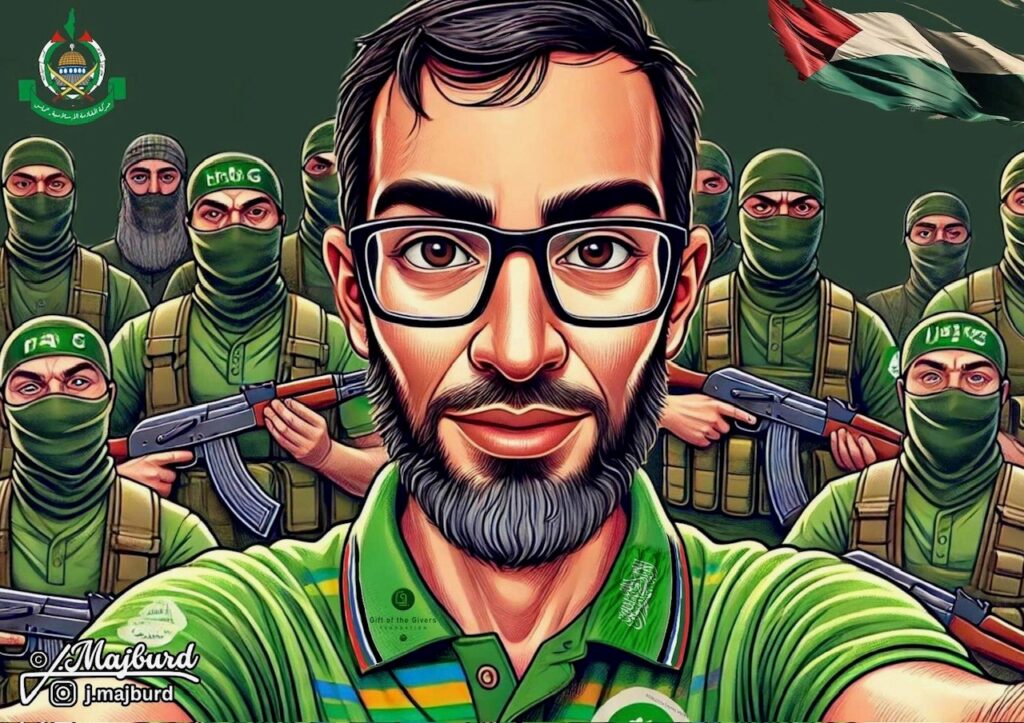
Moreover, GOTG is listed in Arabic under its founding name Waqful Waqfin as a member of the Union of Good [4], an umbrella network created by Sheikh Yusef Al-Qaradawi [5]. This network, allegedly established to support Palestinian organizations, was designated by the U.S. Treasury as a terror organization in 2008 for funding Hamas. Al-Qaradawi, who founded the network, is notorious for his radical ideologies, having issued fatwas that condone violence against civilians, specifically targeting Israeli women and children. Sheikh Ebrahim Gabriels, a prominent South African Muslim leader, has also been linked to the Union of Good [3], serving as both a board member and chairman of the Al Quds Foundation/Al Aqsa Foundation [6]. These connections deepen the ideological concerns surrounding GOTG, given its documented affiliations with individuals and organizations supporting extremist agendas.
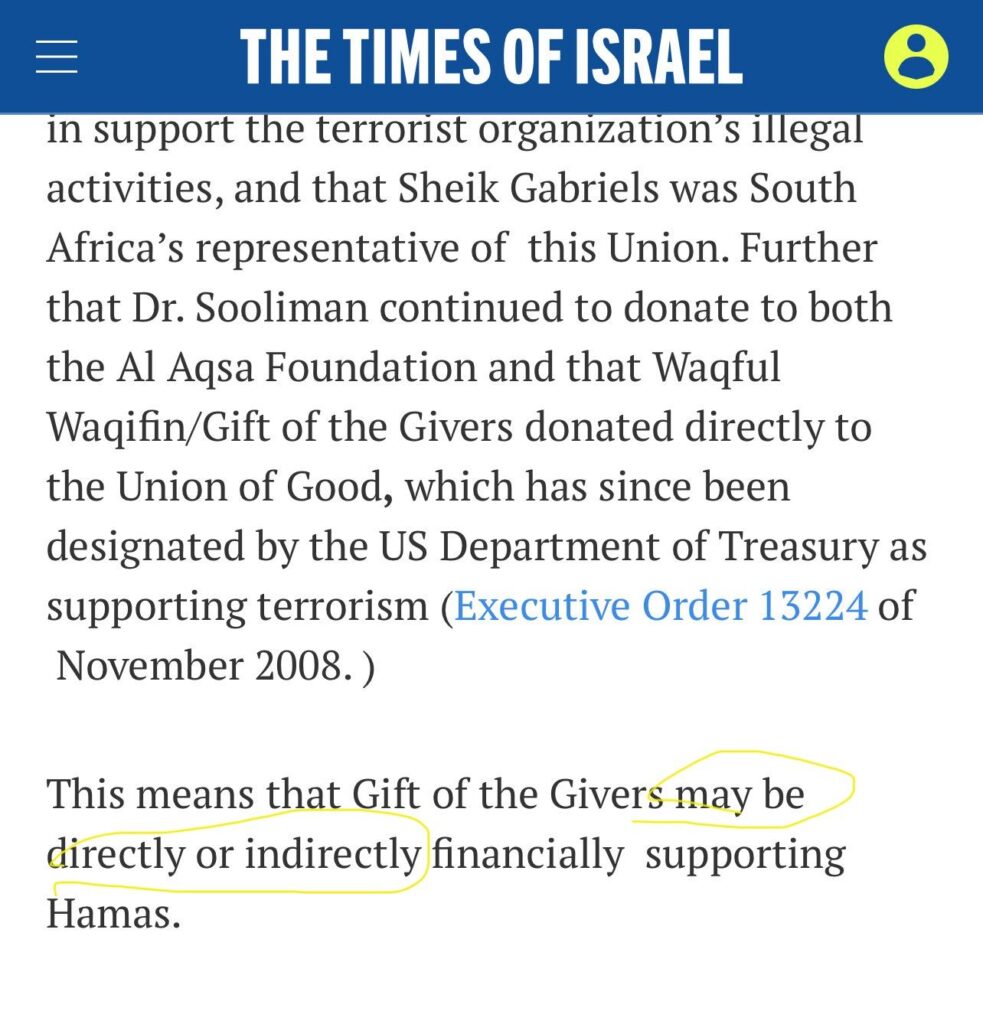
The Union of Good: An Overview
The Union of Good was established to streamline financial support for Hamas and other entities within Palestine, allegedly using humanitarian aid as a facade for terror financing. As an umbrella organization, the Union of Good consolidated various charities that were sympathetic to Hamas, a group responsible for numerous attacks against civilians and designated as a Foreign Terrorist Organization by the U.S., Israel, and other countries. In 2008, the U.S. Treasury officially sanctioned the Union of Good under Executive Order 13224, freezing its assets and criminalizing transactions with the network.[7]
The archived Union of Good website shows that both the Gift of the Givers Foundation (under its original name, Waqful Waqifin Foundation) and the Al-Aqsa International Foundation are listed as affiliated organizations under the Union of Good’s network. The Union of Good, an umbrella group of international Islamic charities, was established to provide financial and logistical support to Palestinian territories, with a particular focus on areas controlled by Hamas. It has been designated as a terror-financing organization by several governments, including the United States, due to its alleged financial links with Hamas, which is recognized as a terrorist organization by multiple countries.[8]
- Main Landing Page Translation and Explanation
• Banner Title: “Union of Arab and International Islamic Organizations”
• Featured Image: Yusuf Al-Qaradawi, prominently displayed on the main page, is identified as the “Chairman of the Union of Good.” Al-Qaradawi was a well-known Islamic scholar and a key figure in organizing global support for Palestinian causes. His presence on the landing page signifies his role in steering the Union’s mission and objectives.
• Notable Headline Articles:
o Article 1: Discusses a rally involving international Islamic organizations to demonstrate solidarity with Palestinians, particularly opposing Israeli occupation and settlements.
o Article 2: Mentions disruptions in a Palestinian school near a separation wall, underscoring the difficulties students face due to the occupation.
o Article 3: Criticizes Israeli policies around Jerusalem, particularly around religious sites like Al-Aqsa Mosque, stressing the alleged violations.
o Article 4: Reports mass arrests of Palestinians by Israeli forces, highlighting civilian impact.
o Article 5: Coverage of a regional summit calling for unity among Arab nations to support Palestine. - Affiliated Organizations by Country
• South Africa:
o Waqful Waqifin Foundation: Also known as the “Gift of the Givers Foundation.” This South African foundation is recognized on the site as part of the Union of Good network, showing their support and involvement in Palestinian relief efforts.
o Al-Aqsa International Foundation: Another organization with branches worldwide, dedicated to aiding Palestinian causes, especially around religious sites.
• Other Countries:
o Lists multiple organizations from countries like the UK, Netherlands, Belgium, and more, each affiliated under various charitable names aimed at supporting Palestinians through financial and logistical support. - Key Figures and Individuals
• Ebrahim Gabriel (South Africa):
o Listed as a significant South African religious figure connected to the Union of Good. His role likely involves advocacy and community mobilization within South Africa to support Palestinian causes, aligning with the Union’s broader objectives.
o The inclusion of figures like Ebrahim Gabriel suggests the Union’s reliance on respected community leaders worldwide to foster local and international support for their initiatives.
• Sheikh Raed Salah and Dr. Azam Naaman Saleh (Palestine):
o Known for activism and advocacy related to Palestinian rights and religious freedoms, especially in relation to the Al-Aqsa Mosque.
• Yusuf Al-Qaradawi:
o Central figure as the Chairman of the Union of Good. His influence and authority in Islamic scholarship lend credibility to the Union’s objectives. Al-Qaradawi’s endorsement aligns with the Union’s mission to frame their activities within a religious and humanitarian context. - List of Articles and Sections
• General Themes:
o The website sections emphasize calls for solidarity among Arab and Islamic organizations to support Palestine. The articles cover various forms of resistance against occupation, focusing on issues of sovereignty, religious rights, and humanitarian aid.
• Humanitarian and Religious Support:
o Many articles and listed organizations focus on humanitarian aid, with an emphasis on maintaining religious sites, particularly in Jerusalem. This reiterates the Union’s approach of blending religious duty with humanitarian objectives.
• Call for Unity and Coordination:
o The page includes frequent calls for Islamic unity to address the perceived injustices against Palestinians. These calls are presented in terms of both religious obligation and humanitarian responsibility. - Structure and Layout
• Side Menu Options:
o The right side of the page provides quick links to specific sections like:
News Reports and Updates: For current events affecting Palestine.
Studies and Reports: Likely articles analyzing the situation in Palestinian territories.
Member Organizations: A directory of affiliated groups in various countries.
• Video Section:
o A link to view videos related to the Union’s activities, possibly showing demonstrations, charity drives, or statements from affiliated leaders.
The Union of Good was reportedly formed to circumvent restrictions on direct donations to Hamas, allowing funds to be sent to Palestinian territories under the guise of humanitarian aid. The organization’s founder, Yusuf Al-Qaradawi (prominently featured on the website), has been noted for his ideological support of groups engaged in militant activities against Israel, further suggesting the Union’s support for violent resistance rather than purely humanitarian efforts.
Operating under the guise of humanitarian assistance, the Union of Good’s channels have been exploited to funnel millions of dollars annually into Hamas-controlled areas, blurring the lines between charity and ideology-driven support. The U.S. Treasury described the network as integral to Hamas’s infrastructure, using donations meant for humanitarian efforts as a cover for supporting terrorism. GOTG’s documented connection with this network, therefore, warrants concern among international law enforcement and regulatory agencies.
“I Break the Law All The Time” – Imtiaz Sooliman
“I follow Koranic law… I break the laws all the time.” This declaration underscores his conviction that religious directives take precedence over secular or governmental regulations in his work.
This statement raises ethical and legal concerns, especially in the context of a humanitarian organization operating across multiple countries, including politically sensitive regions like Gaza. For an organization that deals with international stakeholders, aid distribution, and financial donations, an open defiance of secular laws could indicate a potential risk for misuse of funds or non-compliance with international standards on transparency and accountability.
Such a stance challenges the foundational principles of transparency and legality expected from international charities. GOTG’s involvement in areas where secular law is essential for coordination with global entities might be compromised by this approach. This defiance raises critical questions for law enforcement and regulatory bodies that must evaluate whether such ideological leanings influence GOTG’s operations and partnerships.[10]
Financial Opacity and Risks of Misuse
Transparency is fundamental for any charitable organization, especially one operating in politically sensitive regions. However, GOTG does not provide publicly accessible financial records or detailed audits, raising questions about its financial practices. In Gaza, GOTG has facilitated cash distributions, documented on video, yet without clear oversight or accountability mechanisms. These actions, particularly in regions under Hamas control, increase the risk that funds could be misdirected or fall into the hands of extremist factions.
Engagement in Hostage Situations: Humanitarian Aid or Strategic Positioning?
GOTG’s success in negotiating hostage releases with groups like ISIS and Al Qaeda is undeniably notable. Yet, the organization’s access to terror groups in Yemen and Syria raises questions: how does GOTG manage such negotiations where formal authorities fail? The frequency of these engagements implies a deeper network of relationships that warrants further investigation.
Antisemitic Statements and Extremist Rally Participation
On October 5, 2023, Dr. Sooliman participated in a rally where flags of Hamas and Hezbollah, both proxies funded by Iran, were displayed. During this event, Dr. Sooliman reportedly made antisemitic remarks, stating, “They run the world with fear, control with money, and terrify you with antisemitism.” Sharing a platform with individuals promoting extremist ideologies calls into question GOTG’s commitment to impartial humanitarian principles.[11]


The Importance of Transparency and Accountability
The Helen Suzman Foundation stands at a crossroads in allowing Dr. Sooliman to deliver the Memorial Lecture. Helen Suzman’s legacy – one of democratic integrity and accountability – contrasts sharply with Dr. Sooliman’s affiliations and remarks. For an organization that values transparency, inviting a speaker with such divisive ties risks damaging its credibility and could erode public trust in its mission.
Financial Impact and Transparency Concerns
The financial implications of GOTG’s associations are far-reaching. Transparency in charitable organizations is essential, particularly when donations and resources are allocated to regions with active conflicts and entities under international sanctions. GOTG operates in Gaza, where it has distributed cash directly, documented in videos with local Hamas police. However, the absence of clear and accessible financial reports raises critical concerns about accountability and the risk of funds being misappropriated. Videos from 2022 show GOTG staff distributing cash in Gaza, heightening suspicions about whether these funds could inadvertently support extremist factions.[8]
Such lack of transparency could undermine public trust, deter potential donors, and damage partnerships with global organizations. In the worst-case scenario, GOTG’s opaque financial practices might expose financial institutions, both in South Africa and abroad, to legal and regulatory repercussions if funds are suspected of contributing to sanctioned activities.
Who Should Care: The Broader Significance of These Allegations
The implications of these allegations reach beyond South Africa’s borders and concern multiple stakeholders:
Law Enforcement and Intelligence Agencies
GOTG’s connections with designated entities like the Union of Good raise security concerns. Intelligence agencies monitoring terrorism financing and law enforcement involved in counter-terrorism must carefully examine these networks, particularly GOTG’s cash distributions in regions where Hamas exerts control. The ease with which GOTG negotiates with terror groups in hostage situations, often succeeding where official channels fail, suggests a network of relationships that should be investigated.
Financial Regulators
GOTG’s financial practices pose risks to banking and financial institutions, especially if donations flow to regions where sanctioned groups like Hamas operate. Regulatory bodies need to ensure that charitable donations are not inadvertently financing terrorism, which could subject institutions to sanctions violations. Clear, itemized financial disclosures are necessary to confirm GOTG’s compliance with international financial regulations.
The Public and Potential Donors
The public has a vested interest in supporting transparent, ethical organizations. GOTG’s lack of clear financial reporting, its associations with radical entities, and Dr. Sooliman’s own statements about following “Koranic law” over secular law raise ethical concerns about whether GOTG aligns with the values it professes to uphold.
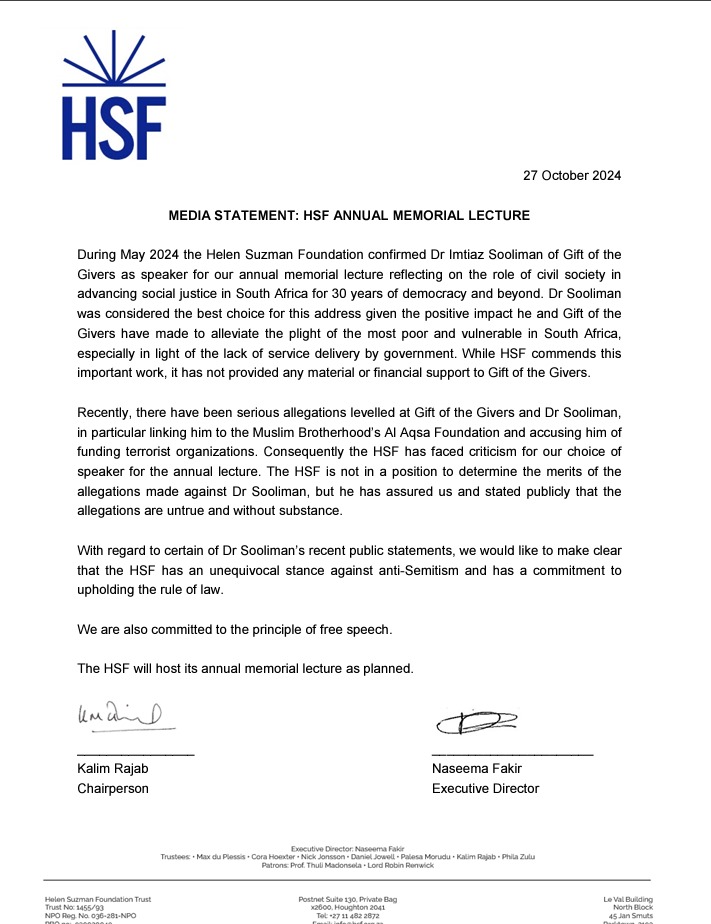
The Helen Suzman Foundation and Other Human Rights Advocates
With Dr. Sooliman set to deliver the Helen Suzman Memorial Lecture, the foundation must evaluate whether platforming a figure with controversial affiliations aligns with its mission of promoting human rights and accountability. Failure to address these associations could compromise the foundation’s integrity and erode its commitment to democratic principles.
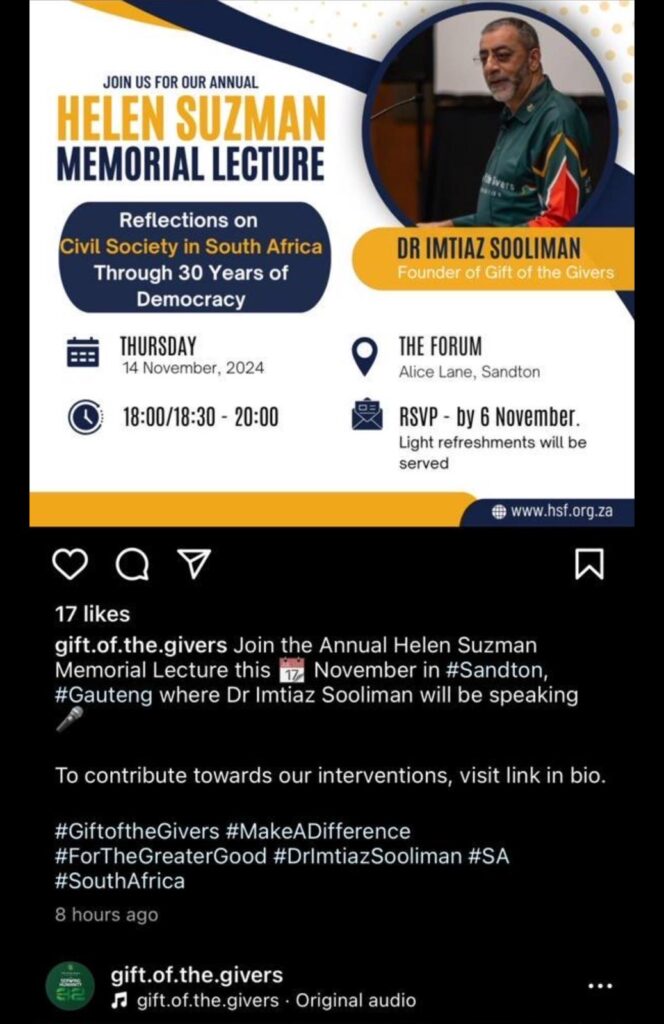
The Need for Transparency and Accountability
Given the seriousness of these allegations, GOTG must commit to transparent, itemized financial disclosures and clarify its ties to sanctioned groups. Trust in charitable organizations depends on adherence to ethical and legal standards, particularly when operating in politically volatile regions. As such, GOTG’s associations and practices warrant close examination to ensure its continued credibility and alignment with international humanitarian values.
The public, law enforcement, and financial regulators alike must demand transparency from organizations like GOTG to prevent humanitarian efforts from being exploited as fronts for ideologically driven agendas. The Helen Suzman Foundation, too, should weigh these issues carefully as it decides on whether Dr. Sooliman is a suitable figure to represent its legacy.
Endnotes
- City Press Allegations – City Press article detailing allegations against Gift of the Givers’ financial transparency and ideological associations. [https://www.news24.com/citypress/news/imtiaz-zooliman-hits-back-at-allegations-that-gift-of-the-givers-is-financing-terrorism-20241027]
- Waqful Waqfin NPO Registration (Reg)
- Hamas’ South African Support Network
https://nationalinterest.org/feature/hamas%E2%80%99-south-african-support-network-209802
Banking woes for SA charity suspected of financing Hamas
https://www.dailymaverick.co.za/article/2013-01-18-banking-woes-for-sa-charity-suspected-of-financing-hamas/ - Pictures of archived website with translations (Pic A)
- INTERPOL MOST WANTED AL QARADAWI [B]
- https://mjc.org.za/2019/01/30/al-quds-foundation-sa-inaugurates-new-national-director/
- Union of Good Designation as Terrorist Organization – U.S. Treasury designation of Union of Good under Executive Order 13224.
- https://web.archive.org/web/20040206125900/http://www.101days.org/arabic/index.htm
- [https://web.archive.org/web/20131020220043/http://www.treasury.gov/press-center/press-releases/Pages/hp1267.aspxVideo Documentation of Cash Distribution in Gaza – 2022 video showing GOTG staff distributing cash in Gaza with local police. Available on GOTG’s Middle East Facebook page. (VIDEO CASH FOR PALESTINE)
- US Treasury Sanctions on Al Aqsa Foundation – U.S. Department of Treasury, Executive Order 13224, “Specially Designated Global Terrorist Entity.” [Link to official document]
- Public Statements by Dr. Imtiaz Sooliman – Statement on “breaking laws” from a recorded video interview. (Video I DON’T FOLLOW INTERNATIONAL LAW)
- October 5 Rally Participation – Video and photos from the October 5 rally with banners and flags of Hezbollah and Hamas. (They Control the world video Picture 1 and picture 2 Cape Town rally oct 5th)
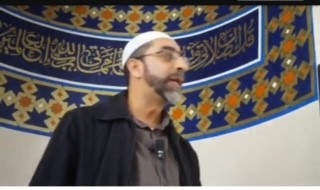
No responses yet